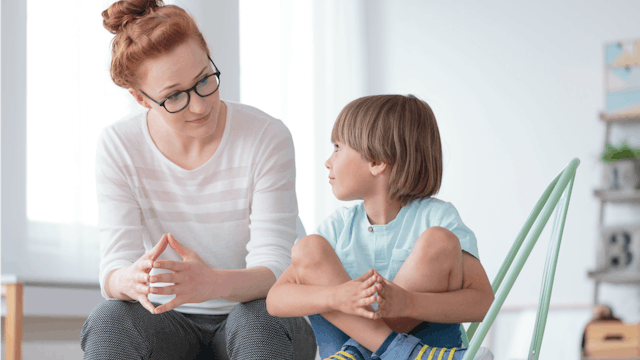Why We Need To Talk To Ours Sons About Women's Periods, And How To Do It

My sons are like most boys their age with one notable exception: their playroom happens to share the basement with 10,000 menstrual hygiene products. They happen to have tampons in their toy chests and maxipads mixed with their Legos. My boys also know what these items are used for and no longer scrunch their noses in disgust at words like “flow” or bat an eye at the mention of “absorbency.”
Why?
Because I told them about periods. You should tell your boys, too.
As the CEO and founder of the nonprofit organization I Support the Girls, I work with my team to provide bras and menstrual products for girls and women experiencing homelessness. Because of this, I am inundated with tampons and maxipads and my home is filled with donations to be shipped out to our nationwide affiliates. But before my boys were exposed to the “business” side of tampons, I discussed my monthly period with them.
With my sons, I shared that periods are natural, that blood usually occurs for a week every month for decades, that mommy might not feel well as it starts, and some women have different symptoms. On their level, they understand what’s happening to my body each month as well as their teachers, aunts, and soon, their friends. On a larger level, it helps them comprehend that the 200,000 women experiencing homelessness we serve at I Support the Girls also have periods.
Half the population has periods, so why not make sure the half that doesn’t is also informed? I want to make the invisible visible for my boys, and I hope they will grow up to be allies and empathizers.
When it comes to discussing menstruation, some parents wait until their child is on the precipice of puberty or when they feel the “the time is right.” The trajectory varies whether they have daughters or sons. Menstruation is typically not discussed with sons beyond a minimum; however, parents should educate their sons proactively about what naturally occurs in a woman’s body.
Using medically accurate online resources or those requested from doctor’s offices can have a positive impact without unnecessarily scary words. Despite ardent social media efforts and 2015 being named the “Year of the Period” by NPR, periods are still taboo. Ignorance can be bliss until, like an unexpected period, the topic can no longer be avoided.
A thoughtful discussion can adapt to a theme of support. For example, a girlfriend shared that her then-11-year-old came home aghast at what his female peers experienced monthly. Health class made a period sound terrifying to her son, and she had to help him realize that it was natural, not scary. School health class can only go so far: I believe fervently that a conversation at home would help children create healthier relationships with women. The more boys fully understand the experiences of their girl peers, the more we can help erase the stigma, shame or even teasing that has been associated with periods.
For older children who may have a better understanding, we can even take it a step further: This is a chance for parents to discuss the current landscape of menstrual equality. What most schools and congressional panels omit is that thirty-six states still impose a sales tax on feminine hygiene products, known as the “tampon tax.” They are taxed as a luxury sales item, not as health items. Women and girls that I’ve met through my advocacy work tell me that they have had to choose between a hot meal or paying bills over purchasing pads because they are one expense too many on a limited income. The next generation of sons and daughters can fix this inequality.
If the topic of periods was a matter of public health, we’d have more vocal advocates — especially male legislators — joining the advocacy chorus. Menstrual products would be perceived as essential as bandages and aspirin, and not icky products for hormonal girls (the way the message is sadly conveyed). By ignoring their existence, we miss a valuable educational and empathy opportunity. I don’t want my sons to cringe when they are adults and are asked to buy tampons. I want them to learn, like Cameron Kasky, a student at Marjory Stoneman Douglas high school who carried tampons in his clear backpack, that fighting for menstrual equality makes all our lives better.
Until we change attitudes, the conversation surrounding menstruation and menstrual equality will continue to be hush-hush. Tell your daughters. Tell your sons. Today. The earlier we start to normalize the conversation with our children, the less of a taboo menstruation will become. It’ll be just another part of the cycle of dialogue. Period.
This article was originally published on